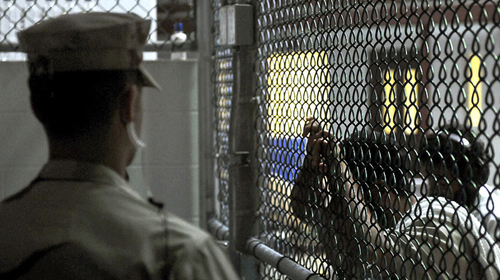
The hunger strike in Guantánamo is now in its fourth month. At the military’s latest count, 100 of the 166 prisoners are on strike, motivated in large part by their indefinite imprisonment without charge or trial. , the largest number yet during this hunger strike. Force-feeding in Guantánamo is a brutal, degrading experience.
On Monday, the ACLU and 19 other organizations sent Secretary of Defense Chuck Hagel a letter stating our opposition to the ongoing force-feeding. As the letter makes clear, the Guantánamo force-feeding procedures constitute cruel, inhuman, and degrading treatment:
The prisoner is strapped into a chair with restraints on his legs, arms, body, and sometimes head, immobilizing him. A tube is inserted up his nostril, and snaked down his throat into his stomach. A liquid nutritional supplement is then forced down the tube. The prisoner is restrained in the chair for upwards of two hours to prevent him from vomiting. As Guantánamo hunger-striker Samir Naji al Hasan Moqbel explained recently: “I can’t describe how painful it is to be force-fed this way. As it was thrust in, it made me feel like throwing up. I wanted to vomit, but I couldn’t. There was agony in my chest, throat and stomach. I had never experienced such pain before.” Debilitating risks of force-feeding include major infections, pneumonia, collapsed lungs, heart failure, post-traumatic stress disorder and other psychological trauma.
The most recent was published yesterday by Al Jazeera. The newest version of the SOP, which was , was adopted in March 2013, and makes a few key changes. Critically, the chief medical officer in Guantanamo no longer makes the final call as to who is labeled a hunger striker. Now, the military commander of the base – who is not a doctor – makes that determination. Deleted is the 2005 SOP’s language directing military personnel to make “every effort … to allow detainees to remain autonomous” up to the point the military believes force-feeding is necessary. The current SOP does not mention autonomy even once. Whereas the 2005 version required personnel to “make every effort to convince the detainee to accept treatment,” the current SOP only requires “reasonable efforts.”
When the Defense Department released the 2005 SOP pursuant to a Freedom of Information Act request, it withheld the actual force-feeding procedures, claiming (quite questionably) they were “related solely to the internal personnel rules and practices of an agency.” The SOP published yesterday, however, is unredacted, and provides graphic detail. It describes the mask put on the men before they are strapped into the force-feeding chair, the full array of restraints used against them, the denial of access to water immediately after feeding, and how if the men vomit – even if involuntarily – after force-feeding, they are to be strapped back down.
We have also urged Secretary Hagel to immediately investigate Guantánamo prisoners’ recent reports of excessive force, isolation, temperature manipulation, and forced sleeplessness. Standing on their own, the allegations raise serious concerns; combined with force-feeding, they become even more worrying.
Of course, the military should be doing far more than ending cruel, inhuman, and degrading force-feeding and any abuse of the men. It should be working diligently and urgently to release Guantánamo prisoners, starting with the 86 men already long cleared to leave the prison. The ACLU will continue to press on all these matters until the rule of law is restored and ill-treatment in Guantánamo ends.
Learn more about Guantánamo Bay and other civil liberty issues: Sign up for breaking news alerts, , and .

